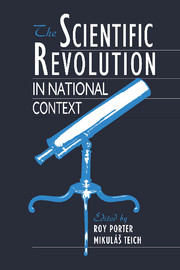Book contents
- Frontmatter
- Contents
- Notes on contributors
- Acknowledgements
- Introduction
- 1 Scientific Revolution, social bricolage, and etiquette
- 2 The Scientific Revolution in France
- 3 The Scientific Revolution in the German Nations
- 4 The new philosophy in the Low Countries
- 5 The Scientific Revolution in Poland
- 6 The Scientific Revolution in Spain and Portugal
- 7 The Scientific Revolution in England
- 8 The Scientific Revolution in Bohemia
- 9 Instituting science in Sweden
- 10 The Scientific Revolution in Scotland
- Index
10 - The Scientific Revolution in Scotland
Published online by Cambridge University Press: 05 June 2012
- Frontmatter
- Contents
- Notes on contributors
- Acknowledgements
- Introduction
- 1 Scientific Revolution, social bricolage, and etiquette
- 2 The Scientific Revolution in France
- 3 The Scientific Revolution in the German Nations
- 4 The new philosophy in the Low Countries
- 5 The Scientific Revolution in Poland
- 6 The Scientific Revolution in Spain and Portugal
- 7 The Scientific Revolution in England
- 8 The Scientific Revolution in Bohemia
- 9 Instituting science in Sweden
- 10 The Scientific Revolution in Scotland
- Index
Summary
the subject of this essay is an historiographical minefield. The very concept of the Scientific Revolution has been challenged on a number of fronts in recent years, and there is now little agreement as to who made the revolution, what the exact nature of the revolution was, and when precisely this protracted event occurred. One might also question the validity of focusing on ‘national’ contexts, for as the distinguished historian J. H. Elliott has warned, the ‘besetting sin of the national historian is exceptionalism’, that is, the inability or unwillingness to see the wood for the trees. Arguably, the need for a less particularistic historical vision is especially urgent when dealing with the early modern period. Despite the growing use of the vernacular, Latin served as the lingua franca in Europe well into the eighteenth century, and this fostered the existence of a cosmopolitan Republic of Letters in which national identities were to a large extent submerged in the broader European realm of learning. Furthermore, during the early modern era regional loyalties were often more powerful than national ones even in a country like France, which boasted a highly developed and increasingly centralized state apparatus. Hence the notion of a French or an English ‘national’ context is an extremely problematic one, in so far as it may not in fact address the contextual specificities it was initially intended to capture.
- Type
- Chapter
- Information
- The Scientific Revolution in National Context , pp. 263 - 287Publisher: Cambridge University PressPrint publication year: 1992
- 3
- Cited by

